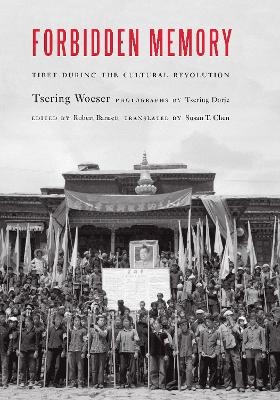
Forbidden Memory
Potomac Books Inc (Verlag)
978-1-61234-969-5 (ISBN)
Access the glossary of Tibetan terms.
Access the glossary of Chinese and English terms.
Access the Index. When Red Guards arrived in Tibet in 1966, intent on creating a classless society, they unleashed a decade of revolutionary violence, political rallies, and factional warfare marked by the ransacking of temples, the destruction of religious artifacts, the burning of books, and the public humiliation of Tibet’s remaining lamas and scholars. Within Tibet, discussion of those events has long been banned, and no visual records of this history were known to have survived.
In Forbidden Memory the leading Tibetan writer Tsering Woeser presents three hundred previously unseen photographs taken by her father, then an officer in the People’s Liberation Army, that show for the first time the frenzy and violence of the Cultural Revolution in Tibet. Found only after his death, Woeser’s annotations and reflections on the photographs, edited and introduced by the Tibet historian Robert Barnett, are based on scores of interviews she conducted privately in Tibet with survivors. Her book explores the motives and thinking of those who participated in the extraordinary rituals of public degradation and destruction that took place, carried out by Tibetans as much as Chinese on the former leaders of their culture.
Heartbreaking and revelatory, Forbidden Memory offers a personal, literary discussion of the nature of memory, violence, and responsibility, while giving insight into the condition of a people whose violently truncated history they are still unable to discuss today.
Tsering Woeser is a Tibetan poet and essayist. She is the most prominent commentator on the Tibet issue still living within China and has written twenty-one books in Chinese, with eighteen translations of her work published in nine other languages, including Voices from Tibet,Tibet on Fire, and two others in English. Woeser has received the Prince Claus Award from the Netherlands and the U.S. Department of State’s International Women of Courage Award. She lives under close surveillance in Beijing. Tsering Dorje (1937–91) was a Tibetan officer in the People’s Liberation Army who served in Tibet during the Cultural Revolution. Robert Barnett is a leading scholar of modern Tibetan history and politics who founded and directed the Modern Tibetan Studies program at Columbia from 2000 until 2017. His books include Lhasa: Streets with Memories, and he is currently a professorial research associate at SOAS, University of London. Susan T. Chen is a longtime collaborator with Tsering Woeser and translator of her work. She received her PhD in contemporary Tibetan culture from Emory University and is visiting assistant professor of history at Wingate University in North Carolina.
Foreword
Wang Lixiong
A Note on the Photographs
Tsering Woeser
Defining Revolution: A Note on the Word Shajie
Tsering Woeser
Introduction
Robert Barnett
A Note on the English Edition
Robert Barnett and Susan T. Chen
I. Smash the Old Tibet! The Cultural Revolution Arrives On the Eve of Revolution
The Sacking of the Jokhang
The Red Guards in Lhasa Take Action How Was the Jokhang Sacked? The Red Guards from Mainland China
The Aftermath of the Sacking of the Jokhang
Who Is to Be Blamed?
After the Sacking Denouncing the Ox-Demon-Snake-Spirits
Ox-Demon-Snake-Spirits in Tibet The Diversification of Activists
Rule by Intimidation: Life Under the Neighborhood Committees Changing Names
The Barkor Becomes “Establish-the-New Avenue” The Norbulingka Is Changed to the “People’s Park”
Renaming Chagpori as “Victory Peak”
II. Civil War among the Rebels: “Whom to Trust—The Faction Decides!” The Two Main Rebel Factions: Key Facts
Factional Ideologies: Fighting over the Same Idea A Rivalry of Blood and Fire
The Dust Settles
III. The Dragon Takes Charge: The People’s Liberation Army in Tibet Military Rule
The People’s Liberation Army in Tibet Conflicts within the Military
The Passionate Dedication of the Military Propaganda Teams Everyone a Soldier: The Tibetan Militia
IV. Mao’s New Tibet: Revolutionary Violence and Destruction The Revolutionary Committees
The People’s Communes
Installing a New God
V. Coda: The Wheel Turns The Karmic Debt
Postscript: Forty-Six Years Later Return to Lhasa
Forty-Six Years Later
Appendix: Jampa Rinchen’s Testimony
Glossary of Chinese and English Terms
Glossary of Tibetan Terms
Notes
References
| Erscheinungsdatum | 02.01.2020 |
|---|---|
| Übersetzer | Susan T. Chen |
| Zusatzinfo | 345 photographs, 2 glossaries, 1 appendix |
| Verlagsort | Dulles |
| Sprache | englisch |
| Maße | 178 x 254 mm |
| Themenwelt | Geschichte ► Allgemeine Geschichte ► Zeitgeschichte |
| Geisteswissenschaften ► Geschichte ► Regional- / Ländergeschichte | |
| Geschichte ► Teilgebiete der Geschichte ► Kulturgeschichte | |
| ISBN-10 | 1-61234-969-2 / 1612349692 |
| ISBN-13 | 978-1-61234-969-5 / 9781612349695 |
| Zustand | Neuware |
| Informationen gemäß Produktsicherheitsverordnung (GPSR) | |
| Haben Sie eine Frage zum Produkt? |
aus dem Bereich


